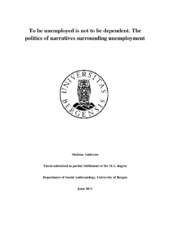| dc.description.abstract | Based on six months of fieldwork in London in the first half of 2012, this thesis aims to understand how unemployment is a situation that is understood in different ways based on political understanding and moral categories. I want to contribute to the anthropological understanding of unemployment by studying the political resistance as a reaction to unemployment being explained in individual terms. This thesis problematizes a certain form of individuality that informs how people might interpret the subject of unemployment. I am focusing on a group of activists that tried to create an alternative discourse to this individuality in Britain by rejecting the current Government's welfare reforms. The reforms, I argue, are the latest features of a developing contractual approach to welfare that obligates those on benefits to fulfil their duties" in order to enjoy their rights as citizens. The social contract with the state that is forged through benefits has obligations that in recent years have increased for the jobseeker, both in moral and economic terms. The main feature of this contractual development is work for your benefits schemes known as Workfare. Alongside this, I am also exploring the everyday life of unemployment as it is understood by a couple of individuals in London who are trying to get by. Drawing on the life stories of these people, I show that even matters that might seem trivial can in fact based on attempts to avoid moralizing and stigmatizing narratives that are interconnected with the social understanding of unemployment in the Britain. These narratives are rooted in a belief that dependency is the product of a lenient welfare state and that this dependency is not only morally wrong but also damaging to the people who are seen to be dependents. Both the Government and much of the mass media were directly or indirectly reproducing these narratives. The solution to this problem of dependency was evidently found in an increased focus on employability among the unemployed. Employability is the inherent ability of the individual to be able to work, not in the physical sense, but rather as a form of work ethic that signifies that the individual is ready and able to do whatever that is demanded of him or her. It has to do with the will to work. This was understood by the activists as a trick by the employers that made it possible for them to exploit the large pool of unemployed people who would have to be subjected to whatever it was demanded of them. I conclude that unemployment and individual responsibility are two concepts that are intertwined in social policy, and have been taken for given official discourse. This line of thinking serves as a part of a particular narrative that I have been aiming to deconstruct in this thesis, by using the narratives of the activists as a focal point. | en_US |
